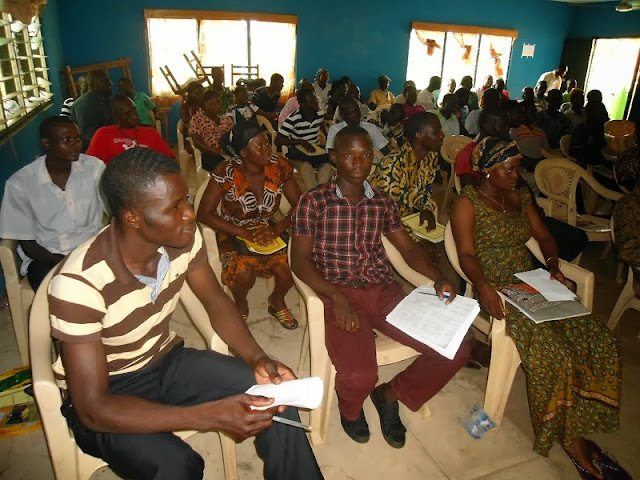School for Life is currently running a trial to use National
Service Personnel to lead our community based classes. Classes led by community members (known as facilitators)
have been a core component of School for Life’s values since inception, but as
our program expands we are seeking to trial some innovative measures to ensure
all out of school children in Ghana can achieve their potential though
education.
A couple of months ago, twelve National Service Personnel,
all of whom are recent graduates of education programmes at universities in
Ghana were posted to our organisation. After
undergoing training with our volunteer facilitators they were posted to
communities across the Savelugu Nanton district in the Northern Region. This morning we met with them to hear about
their experiences so far, and some of the challenges they are facing.
A lot of challenges were raised by the group, as well as
some successes. One of the most
successful experiences to date was shared with us by Musah Alhassan, about his
posting in the Chahiyili community.
Musah, a recent Diploma of Education Graduate from the University of Winneba,
moved into the Chahiyilli community soon after his posting. In just a few months, he has established
himself as an important and respected member of the community there. In addition to taking the School for Life classes
in the afternoons, he spends his mornings volunteering as a teacher at the nearby
formal school.
He was honest about the challenges he had faced, but also
positive about the experience. He told
the group that if he hadn’t lived in the community he would never have
understood all the reasons why the learners he teaches struggle to go to
school. He gave us one example of a girl
child who was regularly missing classes.
He eventually went to see her mother, who explained that she was discouraging
her from attending as she needed the girl to help take care of baby due to be
born in a few months’ time, and also feared she would not be able to afford the
school fees should the child wish to continue her education after the programme. Musah was able to convince the mother to let
the girl attend, and promised to help her apply for a scholarship when the time
to attend formal school came.
When congratulating Musah for his hard work after our
meeting, he surprised us when he explained the source of his passion for his
work. Having grown up in a community without
a school, Musah did not expect to benefit from education. From a young age, he helped to support his family
by taking care of animals. However, in
1998, he joined a School for Life class in his community! Musah remembers that the classes back then
were not like they are today – his class was held during the night, because at
the time there were so few teachers available to teach in his mother tongue,
Dagbani, that they had to travel from far away after they had taught elsewhere.
Following the nine months of the School for Life Programme,
Musah integrated into the formal school at Gushigu, where he continued on to
Junior High School. After this, he went
to Tamale Polytechnic to study welding and fabrication. However, Musah’s passion for education led
him to dream of purusing future studies in education and to become a teacher. He told me “Because I came from School for
Life, I put my efforts into my work in the community. I want my brothers to benefit from it. I want to inform the image (for my learners),
and shown them that I was able to attend future educational institutions
because of the opportunity School for Life gave to me.”
By Courtney Irwin









